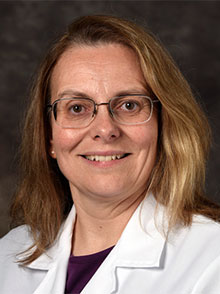The University of Florida College of Medicine – Jacksonville welcomes two new anesthesiology faculty members who are looking to help guide the department as it expands its education and research activities.
Carol Ann Diachun, MD, has joined the department as an associate professor and associate chair of education. Gary Loyd, MD, has come aboard as a professor and associate chair of research. Both are in their first year at the University of Florida.
Michael Lewis, MD, professor and chair of anesthesiology at COMJ, recruited Diachun and Loyd for the two newly created positions. These additions are part of Lewis’ goal to make it the “best small anesthesiology department in the country.”
“I’m ecstatic about the recent changes,” Lewis said. “We are a very different department than we were a year ago, and we plan to continue growing and moving forward.”
Diachun and education
Diachun, a New York native, came to COMJ from the University of Rochester School of Medicine and Dentistry, where she was an associate professor of anesthesiology.
She was associate director of that department’s residency program. What intrigued her about coming to Jacksonville was, among another things, the opportunity to direct a program.
Each year, COMJ’s anesthesiology department welcomes four new residents, who spend three years in the program. That means at all times, the department has 12 residents completing various rotations. In addition, the department has one obstetric anesthesiology fellow each year.
Diachun wants the anesthesiology department to use a competency-based approach to instruction and training. That method requires a resident to focus on one individual skill or area, master it, and then move on to the next area.
Multiple assessments and feedback are used along the way to ensure a resident is attaining proficiency in each area. This contrasts to a traditional time-based approach to learning, where a resident provides care under faculty guidance for a given time, and it’s assumed the resident has attained certain competency levels by the end.
“Active learning” will also be a huge emphasis. Residents will be required to do more tasks outside the classroom, such as reading and engaging in pre-operative discussions with a faculty member the day before taking part in a surgical operation. Diachun believes those types of activities foster livelier and more-beneficial classroom discussions.
“I’m here to guide them, not to tell them how to do it,” Diachun said. “We want people to be lifelong learners.”
Loyd and research
Loyd, a Kentucky native, came to COMJ from the University of Louisville School of Medicine, where he was interim chair of the anesthesiology department.
Here, Loyd has assumed two major roles – leading the anesthesiology department’s research efforts and guiding the creation and launch of the campus’ perioperative surgical home (PSH).
A PSH is a model of care that focuses on patients’ care from pre-surgery all the way through rehabilitation. The aim is for all involved medical staff to be on the same page and to find ways to improve efficiency, reduce expense and foster better patient outcomes. Providers on the UF Health Jacksonville campus are now implementing this model.
“This is the thing that brought me here,” Loyd said about guiding the PSH.
Regarding anesthesiology research, Loyd expects the department to have nearly 30 trials underway by the end of 2015. At present, only three are ongoing.
“I want to energize the faculty and give them all the tools they need to conduct research and to secure funding to support our programs,” Loyd said.
A love for anesthesiology
The general public – and perhaps even some in the medical community – may not be aware of all the responsibilities anesthesiologists have. These physicians oversee everything during surgery except the actual cutting; they do more than just administer sedatives, analgesics and other anesthetics.
Anesthesiologists assess patients’ risks during pre-operative evaluations. They ensure patients are in the best possible condition prior to surgery and build rapport to see that patients are as comfortable as possible with their pending operation.
During an operation, an anesthesiologist closely monitors a patient’s vital signs and carefully administers the drugs, as anesthetics have a narrow therapeutic window. Diachun said she loves that interplay between medicine and surgery.
“We’re the only doctors who administer our own drugs, and we see the results immediately,” she said.
Loyd said he loves anesthesiology because of his heavy interest in anatomy, pharmacology and physiology.
“I’m able to use all three of them,” he said. “It’s a great fit for me.”
Featured Faculty
2600

Carol Ann B. Diachun, MD, MSEd
Professor
Associate Dean for Educational Affairs